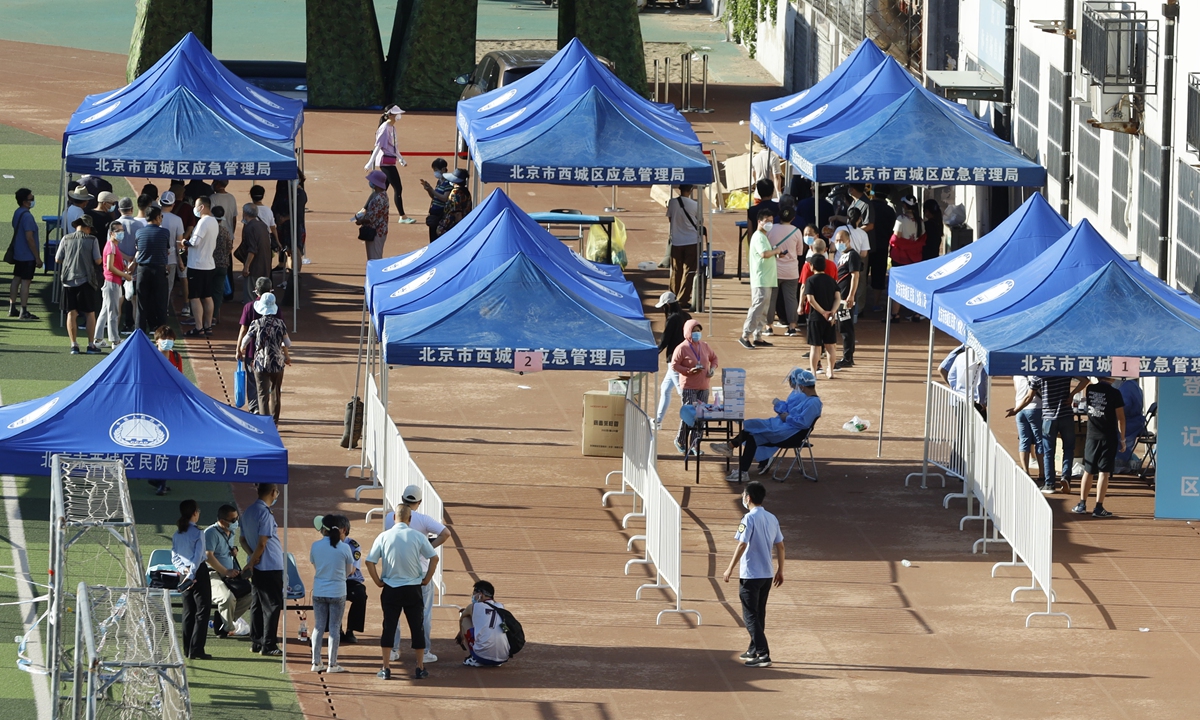Foreign firms in Beijing see little impact from latest coronavirus outbreak
By Yin Yeping and Ma Jingjing Source:Global Times Published: 2020/6/16 19:53:40

Residents follow a health worker to a testing station at a sports center in Xicheng district after Beijing municipal government demanded all residents who visited the Xinfadi food market since May 30 to undergo nucleic acid tests for possible infection with the novel coronavirus after the city reported 51 confirmed COVID-19 cases as of Sunday. Photo: Li Hao/GT
Foreign companies in Beijing have seen little impact of the latest COVID-19 outbreak on their business, but they're actively adjusting their daily operations, after four districts in Beijing entered "wartime mode".
Beijing has strengthened community-level disease prevention and control in response to the resurgence of domestically transmitted cases. Correspondingly, many foreign multinationals have issued instructions, including bans on group meals or changes in work shifts, to keep their employees safe while continuing operations, the Global Times learned.
An employee with a Swiss academic journal institution in Haidian district, Beijing, who declined to be identified, told the Global Times that she was told to go home as soon as she arrived at the office in the morning.
"After all residential communities in Haidian restored second-level alert, our company began to implement a 50-percent attendance policy -- namely, only half of the employees can be at the office at one time," she said.
A source with a large South Korean technology company based in Beijing, who asked not to be identified, told the Global Times that employees who had recently visited the Xinfadi wholesale food market or had relatives who worked there were told to work from home.
Meanwhile, all business trips have been suspended or canceled, and meetings are being moved online, she said.
"Every section of our company is doing daily checks on the health conditions of each employee who works from home," she said.
A source at Hyundai Motor told the Global Times on Tuesday that the company is operating normally, but with stricter prevention and control measures.
"For example, staff must wear masks at work, avoid having group meals, check their temperatures on a regular basis, and show their health codes when entering or leaving the office building," he said.
Edmund Yang, a PricewaterhouseCoopers partner in Beijing, told the Global Times that the company is following the 60-percent capacity guideline.
"Our management has issued updates on the new development and has asked all staff to submit data on a daily basis to manage the situation," Yang said.
However, despite these wide adjustments, the companies said that there has been little impact on their business operations.
Yang said that although a few colleagues need to observe self-quarantine requirements, there has been no significant impact on the company's operations.
"Guess we're well used to working from anywhere and adjusting accordingly," Yang said.
Wang Yingtao, head of the Beijing representative office of Germany-based dental material manufacturer DMG, told the Global Times that the company's operations in Beijing have hardly been affected by the new outbreak.
"Two-thirds of our business is done in East China and South China, and our Beijing employees have no plans for business trips," Wang said. The company's warehouse in Daxing district, Beijing, is more than 20 kilometers away from Xinfadi, so it's also unaffected by the latest outbreak.
Beijing health authorities reported on Tuesday that 27 new COVID-19 cases were confirmed on Monday, taking the total number of new infections to 106.
Posted in: ECONOMY